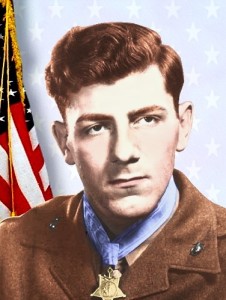Awarded Highest U.S. Medal for bravery
for action at Chosin Reservoir in 1950
Marine Corps Medal of Honor Hero to be
Buried at Quantico National Cemetery
Pfc. Hector A. Cafferata Jr., 1929 – 2016
A full honors funeral service will be held at 11 a.m. at Quantico National Cemetery on April 22 for Marine Pfc. Hector A. Cafferata Jr., who earned the Medal of Honor at the Chosin Reservoir during the Korean War.
Pfc. Cafferata died at the age of 86 on 12 April.
Sergeant Major Ronald Green, Sergeant Major of the Marine Corps, will represent the Commandant.
Commander of the escort will be Gunnery Sergeant Berton Chambers.
Pfs. Cafferata was a rifleman with Fox Company, 2nd Battalion, 7th Marines, 1st Marine Division, on Nov. 28, 1950. More than 10,000 Chinese troops had surrounded Gen. Douglas MacArthur’s U.N. forces at the Chosin Reservoir, including 8,000 from the Marine division. On a frozen, rocky promontory, the 230 or so Marines of Company F had been assigned to protect the Toktong Pass, a narrow escape route through the Nangnim Mountains.
The other members of Cafferata’s fire team became casualties at the pass during the initial phase of “a vicious attack launched by a fanatical enemy of regimental strength against his company’s hill position,” according to his award citation.
With temperatures hovering around 30 below zero, the lone warrior rushed from his hooch wearing little more than a light jacket. Armed with grenades and a rifle, he squared off against relentless fire from automatic weapons, rifles, grenades and mortars. When the smoke cleared, Cafferata had killed at least 15 of the enemy, wounded countless more, and forced those who remained to withdraw.
Heavy gunfire and a well-placed grenade announced the arrival of enemy reinforcements later that morning. The grenade landed in the shallow entrenchment in which wounded Marines found cover. The 21-year-old braved the gunfire, grabbed the grenade, and threw it clear of his fellow Marines. Cafferata’s right hand and arm were seriously wounded in the explosion. Despite the intense pain, he continued to fight until struck by a sniper’s bullet.
“Pvt. Cafferata, by his fortitude, great personal valor, and dauntless perseverance in the face of almost certain death, saved the lives of several of his fellow Marines and contributed essentially to the success achieved by his company in maintaining its defensive position against tremendous odds,” according to his citation.
Cafferata was awarded the Medal of Honor by President Harry S. Truman at a White House ceremony on Nov. 24, 1952. He was one of 42 Marine vets to receive the nation’s highest military award for valor for actions in the Korean War – 14 of whom were awarded for actions in the Chosin Reservoir campaign. Seven of those awards were posthumous. There are 76 MOH recipients alive today, according to the Congressional Medal of Honor Society.
Cafferata was born on Nov. 4, 1929, in New York City. He played semi-pro football and worked at the Sun Dial Corp. when he enlisted in 1948, according to his obituary. He died in Venice, Florida, just north of Cape Coral, where a junior elementary school was named in his honor. Cafferata is survived by his wife, Doris, and four children.
CITATION:For conspicuous gallantry and intrepidity at the risk of his life above and beyond the call of duty while serving as a rifleman with Company F, in action against enemy aggressor forces. When all the other members of his fire team became casualties, creating a gap in the lines, during the initial phase of a vicious attack launched by a fanatical enemy of regimental strength against his company’s hill position, Pvt. Cafferata waged a lone battle with grenades and rifle fire as the attack gained momentum and the enemy threatened penetration through the gap and endangered the integrity of the entire defensive perimeter. Making a target of himself under the devastating fire from automatic weapons, rifles, grenades, and mortars, he maneuvered up and down the line and delivered accurate and effective fire against the onrushing force, killing 15, wounding many more, and forcing the others to withdraw so that reinforcements could move up and consolidate the position. Again fi
ghting desperately against a renewed onslaught later that same morning when a hostile grenade landed in a shallow entrenchment occupied by wounded marines, Pvt. Cafferata rushed into the gully under heavy fire, seized the deadly missile in his right hand and hurled it free of his comrades before it detonated, severing part of 1 finger and seriously wounding him in the right hand and arm. Courageously ignoring the intense pain, he staunchly fought on until he was struck by a sniper’s bullet and forced to submit to evacuation for medical treatment Stouthearted and indomitable, Pvt. Cafferata, by his fortitude, great personal valor, and dauntless perseverance in the face of almost certain death, saved the lives of several of his fellow marines and contributed essentially to the success achieved by his company in maintaining its defensive position against tremendous odds. His extraordinary heroism throughout was in keeping with the highest traditions of the U.S. Naval Service.

